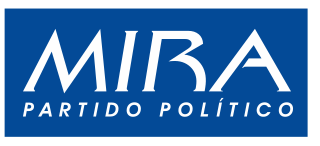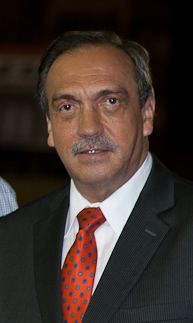
The President of Colombia is the head of state and head of government of the Republic of Colombia. The president heads the executive branch of the national government and is the commander-in-chief of the Military Forces of Colombia.

Departments of Colombia refer to the administrative divisions of Colombia. As of 2024, the unitary republic is made up of thirty-two departments. Each department has a governor and an assembly, elected by popular vote for a four-year period.

The Senate of the Republic of Colombia is the upper house of the Congress of Colombia, with the lower house being the Chamber of Representatives. The Senate has 108 members elected for concurrent (non-rotating) four-year terms.

The Chamber of Representatives is the lower house of the Congress of Colombia. It has 172 members elected to four-year terms.

Soacha is an autonomous municipality of the department of Cundinamarca in Colombia, and part of the Metropolitan Area of Bogotá. It has an important industrial zone and is home to mostly working-class families. Soacha borders Bojacá and Mosquera to the north, Sibaté and Pasca to the south, to the east the capital Bogotá and to the west Granada and San Antonio del Tequendama.

The Political Constitution of Colombia of 1991, is the Constitution of the Republic of Colombia. It was promulgated in Constitutional Gazette number 114 on Thursday, July 4, 1991, and is also known as the Constitution of Human Rights. It replaced the Political Constitution of 1886 and was issued during the presidency of the liberal César Gaviria, with ideas from the also liberal Luis Carlos Galán.

The Independent Movement of Absolute Renovation is a political party in Colombia, founded in 2000 by 51,095 Colombians led by lawyer and former senator Carlos Alberto Baena and Alexandra Moreno Piraquive. The party also has functions as a non-profit organization. It has representation in the Chamber of Representatives and in the Senate of the Congress of Colombia, and has also participated in the public corporations of Colombia at a regional level, being stated as the eighth-most influential political force in the country.

Manta is a municipality and town located in the northeast of the department of Cundinamarca (Colombia), 90 kilometres (56 mi) from Bogotá. It is located in the Almeidas Province in the Tenza Valley. Manta borders to the north Tibiritá, to the west Machetá, to the south Gachetá and to the east Guateque and Guayatá of the department of Boyacá.
The constitutional history of Colombia is the process of formation and evolution of the different constitutions that Colombia has had since its formation.
The Green Alliance is a green political party in Colombia. The party advocates social justice, electoral reform and economic sustainability.

Luis Alfredo Ramos Botero is a Colombian politician. Most recently, he was the Governor of the Department of Antioquia from 2008 to 2011.

Carlos Alberto Baena López is a Colombian lawyer and politician, who serves, since 2020, as Vice Minister for Participation and Equality of Rights of the Ministry of the Interior of Colombia. He served as Senator of Colombia from 2010 to 2014. Baena is a co-founder of the Independent Movement of Absolute Renovation (MIRA) and has served two terms as Party Chairman. Before ascending to Congress, Baena served as Councillor of the Bogotá City Council from 2001 to 2009.

Iván Leonidas Name Vásquez is a Senator of Colombia. A Green party politician he reached the Senate in 2010 after serving as Member of the Chamber of Representatives, Councillor for Bogotá, and Deputy to the Cundinamarca Departmental Assembly.

Germán Zea Hernández was a Colombian lawyer and politician. A Liberal Party politician, he served twice as Permanent Representative of Colombia to the United Nations, and occupied the Ministries of Government, Justice, and Foreign Affairs, was appointed 11th Comptroller General of Colombia, Mayor of Bogotá, and Governor of Cundinamarca, and served in both Chambers of Congress as Senator and Representative.

States of Colombia existed from February 27, 1855, in the Republic of New Granada and the Granadine Confederation, where they were called "federal states". In the United States of Colombia they were called "sovereign states".

Alfonso Dávila Ortiz was a Colombian civil engineer, diplomat, businessman and forester, former ambassador to Spain and Kuwait, Chargé d'Affaires in the United States of America, Governor of the Province of Cundinamarca, President of the Colombian Banker’s Association, twice President of the Colombian Association of Engineers, Councilor of the city of Bogotá, lifelong President of Bogotá’s Jockey Club and member of Colombia’s National Council of Public Works.

Alicia Victoria Arango Olmos is a Colombian politician and businesswoman, who served as the Minister of Interior and the Minister of Labor of Colombia. She was previously the private secretary of President Álvaro Uribe's Casa de Nariño and the nation's ambassador to the United Nations at Geneva.
Humane Colombia, formerly known as the Progressive Movement, is a Colombian far left political movement and party founded in 2011 and led by President Gustavo Petro. The youth wing of the party is known as Juventud Humana.
The 2019 Colombian regional and municipal elections were held on Sunday, 27 October 2019 in Colombia to elect the governors of the 32 departments, deputies to departmental assemblies, mayors of 1,102 municipalities, municipal councillors and aldermen on local administrative boards.
The 2011 Colombian regional and municipal elections were held on October 30, 2011 to elect the governors of 32 departments and their Department Assemblies, the mayors of 1099 municipalities and their city councils, and the Local Administrative Juntas (JAL) of national territories.















